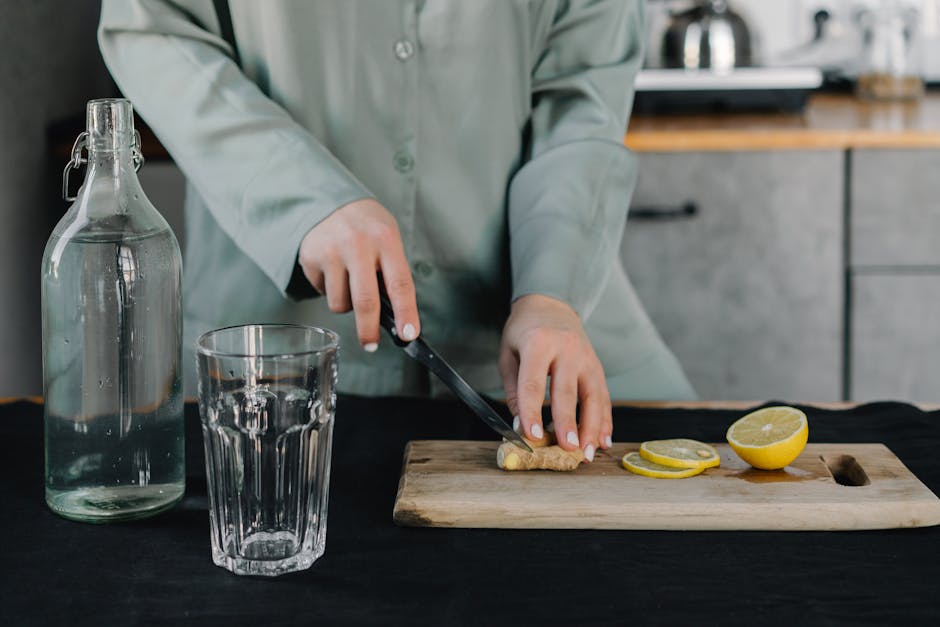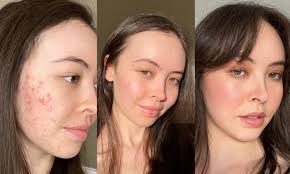Get Your AI Analysis
Personalized skincare insights
Discover your perfect skincare routine with our AI-powered analysis. Get personalized recommendations for glowing, healthy skin.
Start AnalysisFollow Us
Stay updated with the latest skincare tips, trends, and expert advice.
Real Skin Goals: Embracing Imperfections While Improving Health
As a skincare professional with over a decade in this dynamic industry, I've witnessed a profound shift in how we perceive 'perfect' skin. The glossy, filtered images dominating our social media feeds have set an impossibly high bar, often leaving us feeling inadequate. But what if I told you that the secret to truly beautiful skin isn't about chasing an airbrushed ideal, but rather about embracing your unique canvas while fostering its health?
This post isn't about ditching your skincare routine; it's about recalibrating your perspective. We'll explore how to navigate the pressure of perfection, understand what 'healthy skin' truly means, and build a routine that supports genuine skin vitality and confidence, not just a flawless facade. Get ready to embrace your texture, your pores, and the beautiful variations that make your skin uniquely yours, all while making evidence-based choices for its long-term well-being.
The Illusion of Perfection: Unmasking Social Media's Influence
Let's be honest: scrolling through Instagram or TikTok often feels like a masterclass in poreless, glass-like skin. But it's crucial to remember that what you're seeing is rarely reality. Filters, expert lighting, professional makeup, and even subtle digital enhancements create an unattainable standard. This constant exposure can significantly impact our self-perception. A 2021 study by the Dove Self-Esteem Project found that 80% of young girls in the UK reported feeling worse about their appearance after looking at images on social media.
Our skin naturally has texture – pores, fine lines, tiny hairs, and occasional redness are all normal and functional aspects of a living organ. Yet, these natural characteristics are often perceived as 'flaws' in the digital age. This pursuit of 'perfection' often leads to over-exfoliation, excessive product use, and a cycle of frustration when unrealistic expectations aren't met.
"Social media has blurred the lines between reality and fantasy, making it harder for people to appreciate their natural skin. My patients often come in seeking solutions for 'problems' that are simply normal anatomical features," says Dr. Anya Sharma, a board-certified dermatologist. "Our role is not just to treat skin conditions, but to educate and empower individuals to understand and love the skin they're in."
It's time to shift our focus from a flawless external shell to a strong, resilient internal foundation. Imperfections are not failures; they are part of your unique story. True skin goals lie in optimizing health, not eradicating every natural nuance.
What "Healthy Skin" Really Means: Beyond the Surface
So, if perfection isn't the goal, what is? Healthy skin is characterized by its function, not just its appearance. It's resilient, well-hydrated, and capable of defending itself against environmental aggressors. Here's what that looks like:
Key Indicators of Healthy Skin:
Strong Skin Barrier: The outermost layer (stratum corneum) effectively seals in moisture and keeps irritants out. A healthy barrier prevents water loss, reduces sensitivity, and protects against environmental damage.
Adequate Hydration: Skin feels supple, not tight or flaky, indicating sufficient water content in the epidermis.
Balanced Microbiome: A diverse community of microorganisms living on the skin's surface contributes to its defense and overall health.
Even Tone (within natural variation): While hyperpigmentation or redness can be concerns, a healthy skin tone is generally consistent across the face, reflecting underlying health rather than complete absence of any color variation.
Efficient Cell Turnover: Dead skin cells are shed regularly, allowing newer, healthier cells to surface, contributing to a natural radiance.
Resilience: Skin recovers well from minor irritations or environmental stressors.
These functional aspects are far more important than a poreless finish. For instance, a compromised skin barrier can lead to increased sensitivity, dryness, and even a worsening of conditions like acne or eczema. Research published in the Journal of Investigative Dermatology consistently highlights the critical role of barrier function in overall skin health and disease prevention.
Embracing Your Natural Texture & Imperfections
This is where the real work begins: a mental shift. Instead of fixating on every pore or fine line, try to view your skin as a complex, living organ that tells a story. Here’s how to cultivate a more accepting relationship with your skin:
Acknowledge Normalcy: Pores are essential for hair follicles and sebum excretion; they cannot be erased. Texture, whether from mild scarring, sun damage, or simply the way your skin folds with expression, is natural. Even subtle differences in pigmentation, like freckles or melasma, are a common part of our genetic and environmental heritage.
Focus on Feeling, Not Just Seeing: How does your skin feel? Is it hydrated, comfortable, and calm? Prioritize these sensations over visual perfection.
Mindful Mirror Work: Instead of scrutinizing, practice looking at your reflection with kindness. Notice what you appreciate about your features, not just what you perceive as flaws.
Unfollow & Detox: Curate your social media feed to include diverse representations of skin. Unfollow accounts that trigger feelings of inadequacy and seek out those promoting body and skin neutrality.
"The most transformative change I see in my clients isn't just from a product, but from a mindset shift," notes Sophia Rodriguez, a licensed esthetician and skin health coach. "When you start to appreciate your skin's natural state, you approach skincare from a place of nourishment and care, rather than correction and criticism. That's when real confidence blossoms."

Evidence-Based Skincare for Genuine Health
Embracing imperfections doesn't mean neglecting your skin's health. Quite the opposite! It means choosing products and practices that support its vitality and resilience, addressing concerns with a gentle, effective approach. Here's a framework for an evidence-based routine:
1. Gentle Cleansing:
Remove impurities without stripping your skin. Look for pH-balanced, sulfate-free cleansers. Over-cleansing can disrupt your skin barrier. My recommendations: CeraVe Hydrating Facial Cleanser or La Roche-Posay Toleriane Purifying Foaming Cleanser.
2. Targeted Treatments (As Needed):
This is where you address specific concerns like acne, hyperpigmentation, or signs of aging. Choose ingredients with proven efficacy:
Retinoids (Vitamin A derivatives): The gold standard for cellular turnover, collagen production, and treating acne. Start with a low concentration (e.g., 0.25% retinol) a few times a week. Product picks: Paula's Choice 0.3% Retinol + 2% Bakuchiol Treatment or The Ordinary Granactive Retinoid 2% Emulsion.
Antioxidants (e.g., Vitamin C): Protect against free radical damage from UV radiation and pollution, brighten skin, and stimulate collagen. Apply in the morning. Product picks: SkinCeuticals CE Ferulic (a splurge, but highly effective) or Timeless 20% Vitamin C + E Ferulic Acid.
AHAs/BHAs (Exfoliants): Alpha Hydroxy Acids (glycolic, lactic) exfoliate the surface, improving texture. Beta Hydroxy Acids (salicylic) are oil-soluble and great for decongesting pores. Use 2-3 times a week. Product pick: Paula's Choice 2% BHA Liquid Exfoliant.
3. Hydration & Barrier Support:
Restore and maintain your skin's moisture balance with ingredients like hyaluronic acid, ceramides, and glycerin. These strengthen your skin barrier. My recommendations: Vanicream Daily Facial Moisturizer or Krave Beauty Great Barrier Relief (packed with barrier-supporting ingredients).
4. Daily Sun Protection:
Non-negotiable. Daily broad-spectrum SPF 30+ prevents photoaging (fine lines, wrinkles, dark spots) and reduces skin cancer risk. This is the single most important step for long-term skin health. Product picks: EltaMD UV Clear Broad-Spectrum SPF 46 or Supergoop! Unseen Sunscreen SPF 40.

Beyond the Products: Lifestyle for Skin Health
Skincare isn't just what you put on your skin; it's also about how you live your life. These lifestyle factors significantly impact your skin's health and appearance:
Nutrition: A diet rich in fruits, vegetables, healthy fats (omega-3s), and lean proteins provides essential nutrients and antioxidants for skin repair and protection. Limit processed foods and excessive sugar, which can contribute to inflammation.
Hydration: Drink plenty of water throughout the day to keep your skin cells plump and functioning optimally.
Sleep: Aim for 7-9 hours of quality sleep. Your skin undertakes significant repair and regeneration during rest. Lack of sleep can lead to dullness, dark circles, and impaired barrier function.
Stress Management: Chronic stress triggers cortisol, which can lead to inflammation, breakouts, and impaired wound healing. Incorporate stress-reducing activities like meditation, yoga, or spending time in nature.
Regular Exercise: Boosts circulation, delivering oxygen and nutrients to skin cells and aiding in waste removal. Just remember to cleanse post-workout!
Protection from Environmental Damage: Beyond sunscreen, consider protective clothing, hats, and sunglasses when outdoors. Avoid smoking, which prematurely ages the skin.
Adopting these habits not only benefits your skin but your overall well-being, creating a holistic approach to beauty that is sustainable and genuinely healthy.

